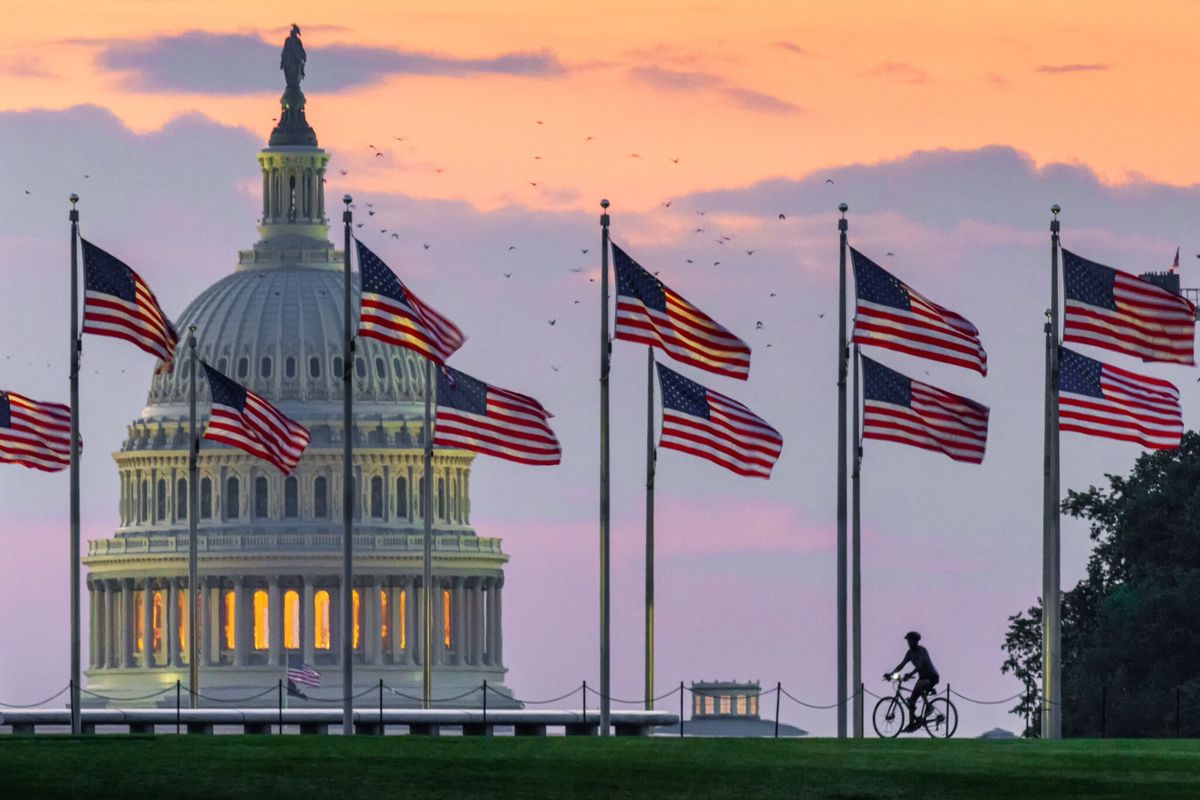OPINION — The Intelligence Community (IC), in a recent press release, said it will lose what it has “used every day to protect the nation from critical threats, inform U.S. Government strategy, and save American lives” if President Biden has not signed into law, legislation that extends Section 702 of the Foreign Intelligence Surveillance Act by December 31, 2023.
Section 702, originally introduced in 2008, and amended twice since then, permits the government to gather foreign intelligence information via electronic surveillance that is targeting specific foreign persons or entities located outside the U.S., even when some intercepted communications may have traveled on U.S.-operated Internet platforms or telephone companies. Incidentally, some of the gathered messages may have been to or from American citizens.
Gen. Paul Nakasone, Director of the National Security Agency (NSA), has described Section 702 as “perhaps our most important authority, that we utilize day in and day out. It provides us an agility to do so much of what we need to do to provide insights to policymakers and warning to our military commanders.”
Section 702’s intelligence gathering accomplishments are significant. But 702’s renewal has been hung up in Congress by those who want it reformed, and others who want the program expanded.
Many critics of Section 702 want to limit its incidental collection of messages that include U.S. persons and/or halt retention or searching of those messages without a specific judicial warrant.
Other critics want to make obtaining foreign intelligence information the sole purpose of Section 702 collection, since at present it is just “a significant purpose”, leaving open the opportunity to add other purposes.
Supporters of Section 702 not only want to continue to exclude the need for new warrants to search its past collected information about U.S. persons, but they also want to expand the original collection purpose to include international drug trafficking information, and also be able to screen records of non-U.S. persons to vet immigration and non-immigrant visa applicants.
It's not just for the President anymore. Cipher Brief Subscriber+Members have access to their own Open Source Daily Brief, keeping you up to date on global events impacting national security. It pays to be a Subscriber+Member.
While there is no consensus on what a renewal of Section 702 should contain, there also is no designated vehicle for the legislation to be presented. One proposal is to attach it to the fiscal 2024 Defense Authorization Bill, which is in House-Senate conference and expected to pass Congress before the year’s end.
There also is the idea that the 702 program may technically continue for another six months, without Congress acting by December 31, because the Foreign Intelligence Surveillance Court in April 2023, certified its current operations to continue in effect for a full year, i.e. until April 2024.
Meanwhile, to boost Congressional support for renewal of Section 702, the Intelligence Community has been publicizing past accomplishments. These declassified disclosures are in sharp contrast to 2013, when Intelligence Community officials kept silent about NSA Section 702 intercept operations after Edward Snowden released selected documents that overstated what the program was actually doing.
Now, in a 30-page booklet entitled Section 702 Basics, put out by the Office of the Director of National Intelligence (ODNI), you can read about the complex process by which intercepts begin and how oversight of the intercept program is conducted. What is also new, is a section called “702 Top Headlines.”
The latter includes items such as, “FISA Section 702-acquired information that successfully identified and mitigated an Iranian ransomware attack against a non-profit organization’s systems in 2022. Within one week, this intelligence enabled the U.S. Government to respond to, mitigate, and ultimately recover the organization’s information without paying the ransom.”
Another item describes how Section 702-acquired information revealed “Foreign actors’ illicit plans to smuggle methamphetamine across the U.S. border. The quantities and potency of drugs, including fentanyl, destined for illegal transfer to the United States, as well as specific smuggling techniques used to avoid detection; the involvement of a foreign official in one foreign narcotics trafficker’s scheme to transport fentanyl pills within the United States; a different foreign narcotics trafficker’s purchase of a vast quantity of pills for transfer to the United States.”
Recognizing Americans’ concern with fentanyl’s impact on the country, White House National Drug Control Policy Director Dr. Rahul Gupta published an op-ed in The Washington Post on November 1, that called for Congress to reauthorize Section 702 because it had obtained critical intelligence about “global supply chains, including networks that stretch from China to Mexico, in producing drugs ultimately pushed into the United States. “
Gupta also disclosed that Section 702 “has informed the U.S. government’s understanding of the origin of a chemical used to synthesize illicit fentanyl in Mexico, provided insight into the quantities and potency of that and other illicit drugs, and exposed smuggling techniques…[and] supported interdictions by our partners, such as a raid leading to the seizure of fentanyl-producing machinery that would have produced millions of fentanyl pills per hour.”
Another public ODNI 10-page paper entitled Section 702 Overview has the following declassified examples of Section 702-acquired information that disrupted planned terrorist attacks at home and abroad along with leading to terrorist leaders themselves.
It describes how in 2022, Section 702 played a critical role in the strike that killed al-Qaeda Leader Ayman al-Zawahiri. Information acquired under the program led U.S. intelligence officials to discover that Zawahiri was living in a safehouse in downtown Kabul. Using this information, Zawahiri was killed by a targeted Hellfire missile strike in that hideout.
In 2015, Hajji Iman was second in command of ISIS and coordinator of ISIS fighters across Syria and Iraq. Using Section 702, NSA collected foreign intelligence information that disclosed the activities and location of Iman and his associates. With this information, U.S. Special Forces launched a raid against Iman in Syria in 2016. In the fighting, Iman and several other associates were killed.
In October 2013, the FBI began investigating Shawn Parson, from Trinidad and Tobago, who had posted a series of comments online expressing his desire to commit terror attacks against Western interests. Using Section 702, the FBI discovered Parson was in Syria and in an especially prolific ISIS network. Parson, a native English speaker, appeared in an ISIS recruiting video and personally encouraged his followers to attack U.S. military bases in Colorado and Ohio, as well as targets in New York City, Chicago, and Los Angeles. Section 702 not only revealed Parson’s own propaganda, but also the identities and rhetoric of his fellow ISIS associates and supporters. This information was shared with international partners and was critical in identifying additional ISIS supporters in those countries and potentially prevented attacks in those countries. Parson was killed in Syria in September 2015.
Cipher Brief Subscriber+Members enjoy unlimited access to Cipher Brief content, including analysis with experts, private virtual briefings with experts, the M-F Open Source Report and the weekly Dead Drop - an insider look at the latest gossip in the national security space. It pays to be a Subscriber+Member.
Najibullah Zazi and a group of accomplices had imminent plans to detonate explosives in coordinated attacks on New York City subway lines during rush hour in September 2009. He had previously received weapons and explosives training at an al-Qaeda training camp in Pakistan. Section 702 collection that was authorized against an email address used by a member of al-Qaeda in Pakistan uncovered an email sent from Zazi requesting urgent advice on how to make explosives. Intelligence officials investigated further and because of information acquired under Section 702, the attack was prevented and Zazi and his co-conspirators were arrested.
Another recent ODNI press release, the FISA Section 702 Fact Sheet, states, “Section 702 has helped uncover gruesome atrocities committed by Russia in Ukraine — including the murder of noncombatants and the forced relocation of children from Russian-occupied Ukraine to the Russian Federation — and the detention of refugees fleeing violence by Russian personnel.”
In addition, it says Section 702-acquired information that has been used to identify multiple foreign ransomware attacks on U.S. critical infrastructure, enabling responses to mitigate these events, and in some instances, prevent significant attacks on U.S. networks.
Section 702-acquired information also helped to stop weapons of mass destruction components from reaching foreign actors; identified and disrupted hostile foreign attempts to recruit spies in the U.S. or send their operatives here; identified key economic security risks, including strategic malign investment by foreign actors in certain U.S. companies, according to this ODNI press release.
Given all the new disclosures, it’s hard not to agree with the statement last July, by the President’s Intelligence Advisory Board after it had reviewed Section 702 when it said, “If Congress fails to re-authorize Section 702, history may judge the lapse of Section 702 authorities as one of the worst intelligence failures of our time.”
Congress should get together, settle differences and send Section 702 renewal to the White House for President Biden’s signature. This is a national security issue that impacts all of us and is too critical to become a “my way or the highway” insolvable, partisan issue.
The Cipher Brief is committed to publishing a range of perspectives on national security issues submitted by deeply experienced national security professionals.
Opinions expressed are those of the author and do not represent the views or opinions of The Cipher Brief.
Have a perspective to share based on your experience in the national security field? Send it to Editor@thecipherbrief.com for publication consideration.
Read more expert-driven national security insights, perspective and analysis in The Cipher Brief















